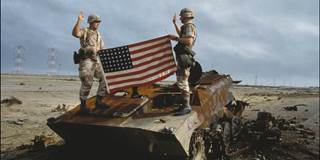In the 15 years since former US President George Bush launched the Iraq War, the Middle East has been wracked by turmoil, and America's standing as the post-Cold War era's benevolent hegemon has been irreversibly eroded. Are US policymakers about to repeat this tragedy of errors?
MADRID – It has been exactly 15 years since the start of one of the most fateful episodes of the early twenty-first century: the Iraq War. After the attacks of September 11, 2001, the French newspaper Le Monde famously declared, “Nous sommes tous Américains” (“We are all Americans”), and even predicted that Russia would become America’s main ally. But US President George W. Bush’s invasion of Iraq in March 2003 blew that prospect to smithereens.

MADRID – It has been exactly 15 years since the start of one of the most fateful episodes of the early twenty-first century: the Iraq War. After the attacks of September 11, 2001, the French newspaper Le Monde famously declared, “Nous sommes tous Américains” (“We are all Americans”), and even predicted that Russia would become America’s main ally. But US President George W. Bush’s invasion of Iraq in March 2003 blew that prospect to smithereens.